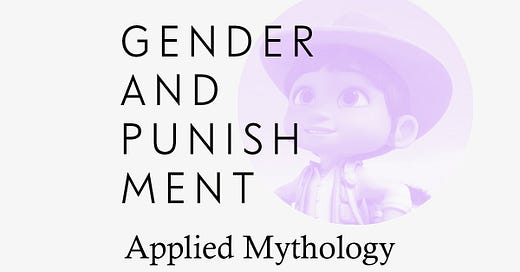
Tiresias, the prophet of Apollo, would have been at the center of today’s conversation around diversity and inclusion. An advisor to the kings of Thebes, Tiresias was known not just for his disability—having been blinded by Athena after seeing her naked—, but for his (unwitting) pioneering of transsexuality. Converted into a woman by Hera over the wanton beating of mating snakes, he stayed in female form for seven years during which time he married and bore children. Tiresias was eventually transformed back into a man after learning the valuable lesson of never to cockblock a snake.
In Apollodorus’ Bibliotheke, Tiresias was drawn into an argument between Zeus and Hera over which gender experienced the greatest sexual satisfaction, a query that he was uniquely qualified to answer. To Hera’s chagrin, he answered that if you divide sexual pleasure into ten portions, men enjoy one of these, and women nine.
One-upping Apollodorus, Sostratus of Phanagoria expanded Tiresias’ sexual shapeshifting into several episodes, wherein Apollo, Hera, Zeus, the Muses and Aphrodite all take turns changing his sex back and forth, before undergoing one, definitive, transformation into a mouse.
Tiresias’ erratic dallying into transsexuality is only rivaled by the anonymous authors of the Mabinogion, who charmingly added incest and zoophilia to the mix. In the story dedicated to king Math, son of Mathonwy, his two wicked nephews—Gilvaethwy and Gwydyon—are forced to transform into animals, alternate their genders, copulate with each other (#NoHomo), and surrender their children to Math over the course of three years.
During the first year, Gwydyon is turned into a stag and his brother Gilvaethwy into a hind. They mate and engender a fawn-child called Hyddwn.
During the second year, Gilvaethwy is turned into a boar and Gwydyon into a sow. They mate and engender a pig-child called Hychdwn the Tall.
During the third year, Gwydyon is turned into a wolf and Gilvaethwy, into a she-wolf. They mate and engender a cub-child called Bleiddwn.
In both myths, our protagonists’ sex change is brought about by a powerful external force, as a means of retaliation for previous trespasses. However, despite their traumatic bodily transformation, their gender identity remains unaffected: Tiresias seems quite pleased to be the only person who can speak to the carnal pleasures of both sexes, and Gilvaethwy and Gwydyon simply go back to business as usual at king Math’s court having atoned for their original offence. All three characters' demeanors are consistent throughout their shapeshifting adventures, and even after partaking in the litmus test for transsexuality—procreation—, they see no need to brandish new names or identities to reflect their transformed selves.
March 20, 2023
Ridley Jones, an animated show for preschoolers, is quietly cancelled by Netflix after its fifth season. Its creator, Chris Nee, attributes the decision to an episode that revolves around the identity crisis of a non-binary child-bison called Winnifred, who prefers to go by Fred.
With transgenderism at the core of US culture wars and corporations testing the boundary between inclusion and boycott, the gap widens between Tiresias and the plethora of mythic tropes exploring sex change, and Fred and the media’s call for sex change to expand into a refurbished notion of gender identity.




